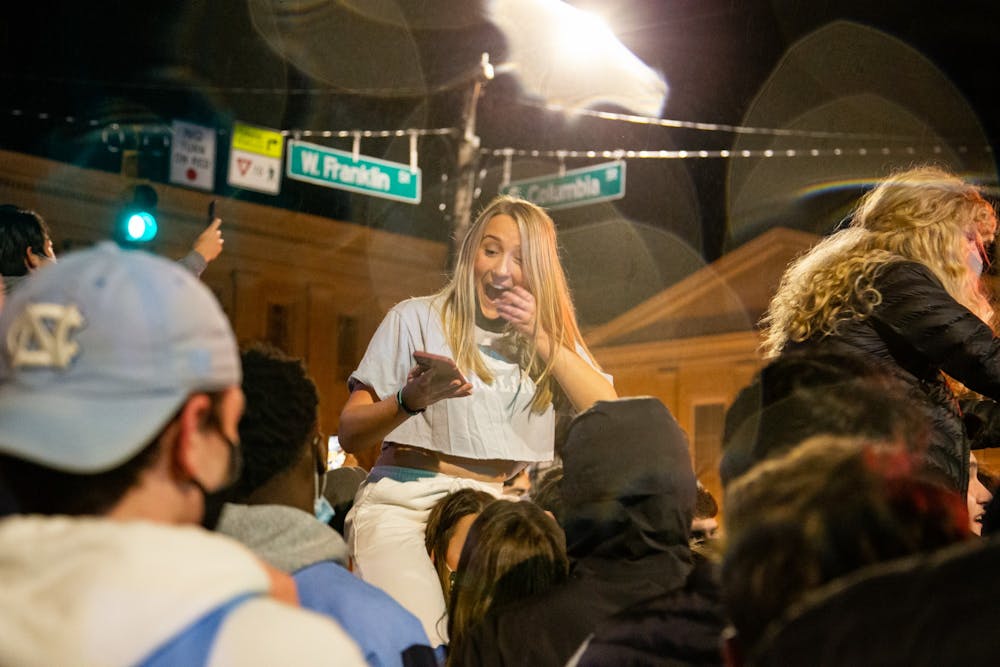Emma Cohn, a sophomore who lives off campus in Chapel Hill, said her gut reaction to seeing hundreds gathered on Franklin Street was disappointed but not surprised, considering UNC moved fully online last semester after only one week of in-person classes.
“I think I’m just sort of appalled at the continuous gall that people have to say, ‘I don’t care about the pandemic, so I’m not going to act like it exists,’” Cohn said. “It’s unbelievable how individualistic people can be and have a complete lack of regard for collective good or public health.”
Izzy Hastings, a junior at UNC who was on Franklin Street at the time of the rushing, said the words "barbaric" and "primal" came to mind to describe the event.
Hastings said she noticed that despite the intersection of Rosemary and South Columbia streets being blocked off — which indicated to her an expectation that rushing would occur — Franklin Street itself wasn’t completely blocked off as a few cars moved around and through the crowd of students.
“It was certainly civil disorder,” Hastings said.
Town, University anticipation
Ran Northam, interim communications manager for the Town, said the cars seen weaving through students were likely already on the street before the crowd arrived.
The University released several messages encouraging students not to rush prior to the game on various social media accounts such as UNC’s Twitter account, the UNC Healthy Heels Instagram account and the UNC Student Affairs Instagram account.
The Town of Chapel Hill said in a Monday press release that it was "hopeful that students would do the right thing" following UNC's message to stay home.
"Regardless, planning efforts by the Chapel Hill Police, Fire, and Public Works departments allowed the Town to get the spontaneous gathering of hundreds of people off the street within about 30 minutes without conflict," the Town said in the press release.
Cohn said UNC administration’s response to the incident — including Chancellor Kevin Guskiewicz’s tweet after the basketball game ended — was ineffective and didn’t address how the University’s general response to COVID-19 enabled the crowd on Franklin Street.
“I think that a lot of the announcements that have gone on, whether specifically to do with rushing, or over the last semester and a half, have been so performative and not addressed any of the substantive claims that have been brought by students, staff or public health officials,” Cohn said.
To get the day's news and headlines in your inbox each morning, sign up for our email newsletters.
On Monday, Amy Johnson, vice chancellor for student affairs, said the Office of Student Conduct had received over 300 COVID-19 community standards violation referrals since Saturday.
"Every referral is reviewed to assess whether the reported action, if verifiable, represents a violation of the COVID-19 Community Standards," Johnson said in a statement.
Burgos said the fact that many students who were photographed and recorded rushing are white speaks to a culture of white privilege at UNC.
“Black students haven’t been seen out there in the same capacity that white students have, which I think says something about how they feel entitled to go out there and do what they want,” Burgos said. “If that was something for Black Lives Matter, or Silent Sam, police would have been out there immediately shutting it down — but because it wasn’t something about Black bodies and racial injustice, they were fine with it.”
Cohn also said she saw the decision to rush amid a pandemic as a display of entitlement and privilege.
“They view their enjoyment of college as paramount,” Cohn said. “And why alter your behavior if you don’t feel like there’s a personal risk to you? The answer to that is that there’s a risk to a lot of other people.”
Pickens said students who claim to be proud of UNC are obligated to not make decisions like rushing in a pandemic, and instead make decisions that are positive for the entire Chapel Hill community — not just the University.
“This community gives so much to the University,” Pickens said. “We owe it to them. We owe it to people like my grandma. We owe it to the homeless man on the street to give a damn honestly, to care about their health. Because if we’re going to come in here and act like this is our home, we have to take care of it. We have to care about other people.”
university@dailytarheel.com



